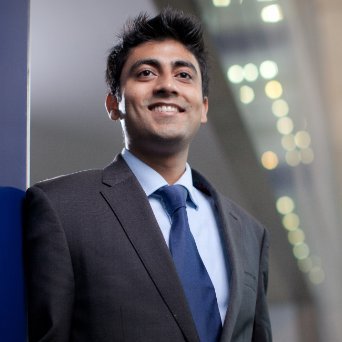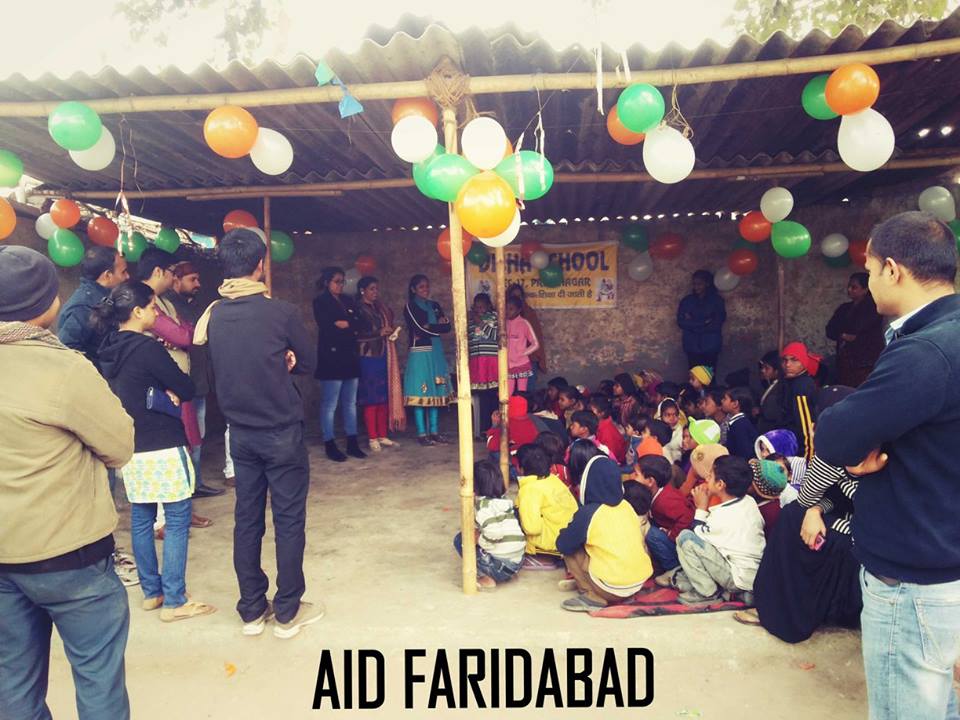Today we are in conversation with Vinay Gupta, a 28 year old investment banking sales professional with Bloomberg Terminal Sales and founder of an NGO, AID Faridabad. He started the organisation at the young age of 21, as a fresh graduate waiting for his new job to officially begin. Now, it’s been seven years into the journey. Vinay shares his interesting experiences with us, including the highs and lows of working to create positive social impact. He also lets us in on how he manages to balance a busy job in Mumbai with leading the growth of AID in Faridabad.

So, Vinay tell our readers a little bit about yourself and also how you got the idea to start AID Faridabad?
It’s been more than seven years since I started AID Faridabad. Back then, I was waiting for my job at TCS to start. I had some free time so I went to check out AID Gurgaon with one of my cousins. Franky speaking, I was moved by what I saw. I started going to AID Gurgaon for 2-3 months. Eventually, the thought struck me that I should do something in Faridabad. One day I had gone to the Faridabad railway station to drop my relatives. Over there, I saw many kids begging and I thought okay, let’s start with these kids.
I got in touch with my friend’s younger brother and one person that I met in AID Gurgaon, who also lives in Faridabad, Sanjeev sir who’s with me even now. We used to go to those camps at Faridabad station every weekend, as we both had our jobs during the weekdays, with just a dari and a black board. We attempted to gather children together and teach them
The first day that you went to those camps, how did you actually approach the parents of the children?
The first day that we approached parents, we told them that we want to teach their children. We asked them if they were currently sending their children to school. The answer in those cases was usually no. There are a few reasons behind this. Firstly, the parents lack motivation. They don’t understand the importance of education. Even if someone is willing to teach their kids for free, it doesn’t matter to them. They were indifferent to us. Our biggest challenge was to change that perception. We used to share food with the kids, fly kites with them and became friends with them. For three to four months, we went there every weekend.
But just going there on the weekends wasn’t providing them with much help. And rather than just sitting under a banyan tree, the kids needed an environment that was conducive to studying properly. So, I went to a school in a nearby community and I negotiated an arrangement to use their facilities such as classroom and desks after hours. They agreed and we had a solid group of about 25-30 kids whom we used to teach in that school. Unfortunately, due to some anti-social elements in that community we were forced to stop our efforts. But we didn’t give up. We approached another nearby community, Sant Nagar. And when we told the people there about our idea of creating a school, they were very excited. That really motivated us.
How did you take care of the logistical aspect of things?
If you want to rent a room for a month, in certain locations you can get it for Rs. 1500-2000. And you have to be physically present at the location. So, if you are opening up anything for the community it has to be within that community. So that the parents are not that sceptical in sending their kids there. Secondly, you need to hire a local person who can go around and ask the parents to send their kids. So, the fixed cost was very minimum, including the rent and a local teacher’s salary. I was earning at that time as well, so the expenditure was manageable.
It’s very surprising to me that it doesn’t cost much to set up something that can create positive social impact. The perception generally is that it costs a lot of money to set up an NGO.
Exactly. When I go to colleges and make presentations over there, the biggest thing that I tell them is that creating positive social impact doesn’t require anything else except the intention to do good things. You need a very strong willpower and motivation to do things. Social work may look exciting or glamourous from the outside but once you get your hands dirty, then you know the realistic situation. It’s very hot these days. It’s quite difficult to go out every day in this kind of weather. That’s where the motivation to get out of the comfortable AC environs comes in.

Is it difficult for you to keep coming back from Mumbai; balancing your job on the one hand and your NGO work on the other hand?
I work in investment banking sales, so usually my working hours can be more than 12 hours per day too. But I do take time off my job. Right now, I’ve taken a couple of weeks off my job. And working on AID Faridabad imparts me with energy and satisfaction, which in turn makes me more productive at my day job too. I have a strong team of volunteers who support me as well. We are now eight to ten people. In fact just yesterday, we had a team lunch at Sanjeev sir’s home with both the volunteers and teachers to celebrate our success of this year. This year we have already sent 55 children to private schools across three schools that we run. About 10 of them are in the pipeline as of now.
One of our volunteers has moved on to Teach for India. Another one will be joining TISS for her MSW. One volunteer is studying at FMS in Delhi but he’s still connected to us and visits us from time to time. All the volunteers are like a family and form a strong alumni network.
What’s it like being the originator/leader at an organisation at a relatively young age?
My experience in leadership at AID Faridabad has taught me a lot of lessons that can be applied to my job as well. The first thing is people management, relationship management, HR issues. Sometimes there will be disagreements between the volunteers and the teachers. And you have to manage people’s expectations accordingly. Managing multiple things; thinking about what’s next, what are the other things that I can do. For example, we’re about to enter into an agreement with Magic Bus. AID Faridabad is pretty small, so I had to make a proper proposal to them. Currently I don’t think that we at AID have the tools at our proposal to provide an extremely high quality of education to our students. Magic Bus will take the students away once a week, and through their unique and innovative learning pedagogies impart them with a sustainable, retention-friendly education. The third thing, is of course, looking after finances.
But something that I have realised is that we have to stick to our core. And our performance has to be measured according to the core. Anything else is extra. Of course you can’t negate the other challenges, but that’s not where our strength lies. Time is limited and you can spend it either solving other issues or sticking to your objective.
What is your short term and long term vision for the organisation?
The short term vision is to put a structure in place where we can scale our operations significantly in the next five years. So right now we are in the process of designing our own curriculum that we want to standardise. The next objective is to have a strong core team of volunteers. It would be wonderful if initiatives similar to AID Faridabad could be established in other cities across India.
The long term goal is to create a unique curriculum that is high quality and low-cost. This could be tested in schools in the. But this is a more of a personal goal and vision. Personally, there diverse fields and domains that interest me such as microfinance and water supply-related issues. I hope I can devote more attention to these after the age of 40.
Well, that’s very interesting. I wish you all the best in your current and future endeavours. Thank you for taking the time out to speak with us today.